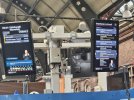K.o.R
Member
- Joined
- 6 Dec 2017
- Messages
- 673
On several of the stations up to Newcastle I see they have added a person doing sign language on the various departure boards.
My question is... what purpose/problem does it serve/solve? A sighted person can read the text on the board, and a non-sighted person would be listening to the announcements. It also seems weird that the person does not have subtitles so you could be certain of what they are currently interpreting.
My question is... what purpose/problem does it serve/solve? A sighted person can read the text on the board, and a non-sighted person would be listening to the announcements. It also seems weird that the person does not have subtitles so you could be certain of what they are currently interpreting.

